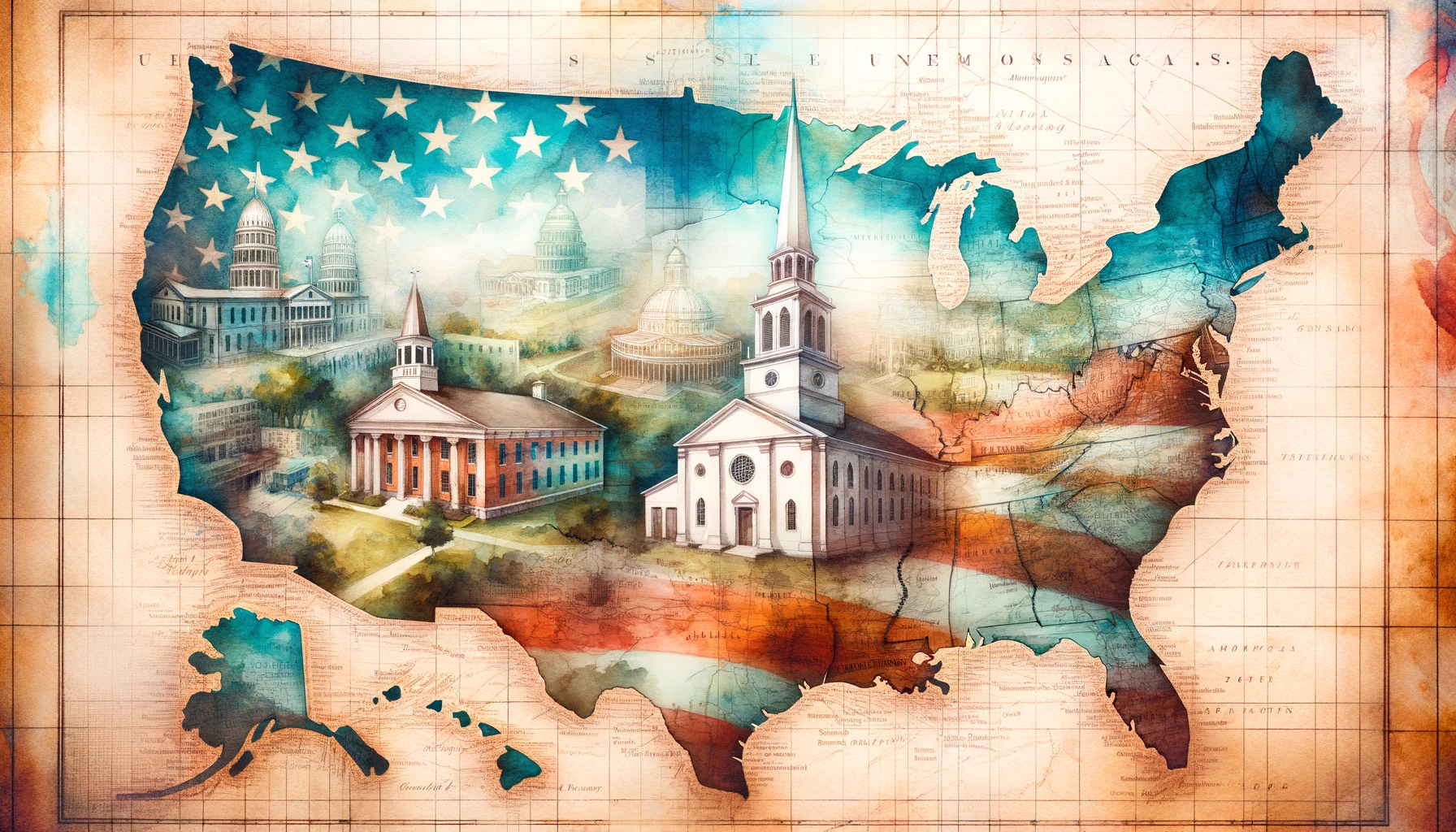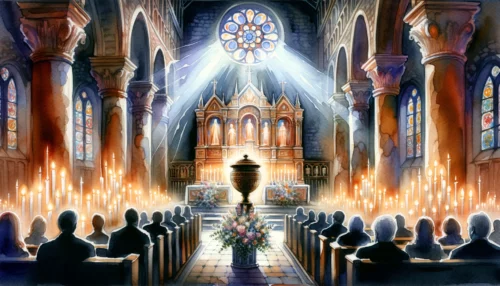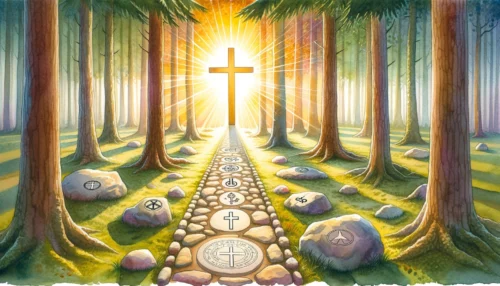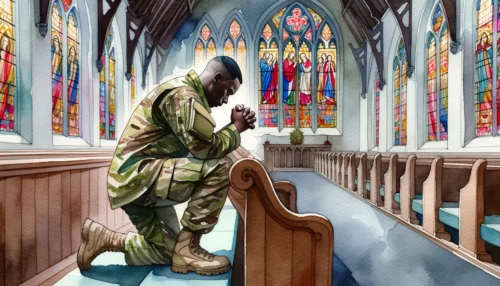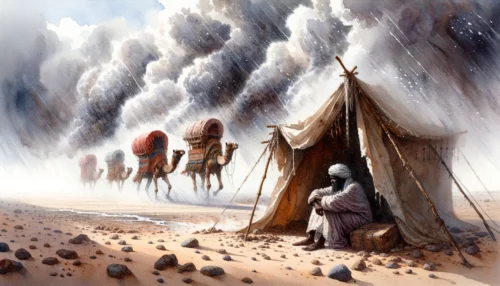The United States of America was established on principles that many associate with Christian values, yet the nature of its religious identity remains a complex matter of interpretation and understanding. We delve into this question, examining the founding principles, the interplay between secular and religious influences over centuries, and the evolving religious landscape today. At the heart of this exploration is not just the nature of America, but the very concept of what it means to be a Christian nation.
The Founding Principles: Christianity or Secularism?
The United States of America, born out of the 18th-century Age of Enlightenment, bears the marks of both Christian and secular influences. It’s important to highlight that many of the Founding Fathers, while influenced by Christian ethics and values, were products of the Enlightenment era. This period emphasized reason, analysis, and individualism rather than traditional lines of authority.
Consider, for example, the idea of natural rights – life, liberty, and the pursuit of happiness, as famously outlined in the Declaration of Independence. These concepts reflect a worldview that believes in inherent human dignity and value, a perspective consistent with Christian teachings about the worth and freedom of individuals (Genesis 1:27). Yet these ideas also echo Enlightenment philosophy, which emphasized human reason and autonomy.
Similarly, the U.S. Constitution, while not explicitly Christian, is built on principles consistent with Christian ethics. The mandate to promote the general welfare and secure the blessings of liberty to ourselves and our posterity, as stated in the Preamble, aligns with the Christian call to love our neighbor as ourselves (Matthew 22:39).
The Constitution also distinctly creates a secular state, with the First Amendment ensuring the freedom of religion. This was a safeguard against the establishment of a state religion, a nod to Enlightenment ideals of religious freedom, and a reflection of the Christian belief in the freedom of conscience (John 8:32).
It’s also noteworthy that the Constitution does not mention God, a departure from many historical governance documents of the time, and perhaps another indication of the Founding Fathers’ commitment to a secular state.
While many of the Founding Fathers were Christians or deists and their values certainly influenced the formation of the nation, the U.S. was not explicitly founded as a Christian nation. Instead, it was built on principles that reflect a mix of Christian and Enlightenment ideas.
The United States was founded on principles which align with Christian ethics and values but also reflect Enlightenment ideals. The Constitution, while espousing many Christian-compatible ethics, deliberately establishes a secular state with a clear commitment to religious freedom. Therefore, it can be said that America’s founding principles are both Christian and secular in nature.
The Influence of Christianity in American History
As the United States began to grow and develop, the influence of Christianity was evident in various aspects of the nation’s history. During the 19th and early 20th centuries, revivals known as the Second Great Awakening and the Third Great Awakening led to a significant increase in Christian denominations. This period saw a surge in moral and social reforms inspired by Christian principles, such as the abolition of slavery and the temperance movement. The belief in the dignity of all humans, rooted in the Christian understanding that all are created in God’s image (Genesis 1:27), was instrumental in these movements.
Christianity also played a major role in the development of America’s educational system. Many of the country’s first universities, such as Harvard, Yale, and Princeton, were founded by Christians with the goal of training Christian ministers and instilling Christian moral values in students. The principles of truth, wisdom, and moral character, aligned with teachings from Proverbs (1:7, 22:6), were foundational in these early educational institutions.
In the realm of politics, Christian influence can be seen in the speeches and writings of many presidents and political leaders who have referred to Christian values and quoted scripture to inspire and guide the nation. For example, Martin Luther King Jr.’s civil rights activism was deeply rooted in his Christian faith. His advocacy for nonviolence and love for one’s enemies was inspired by Jesus’ teachings in the Sermon on the Mount (Matthew 5-7).
While Christianity has been influential in shaping America, it’s not the only influence. The principles of liberty, justice, and equality, while consistent with Christian ethics, are also shared by other religions and secular philosophies.
The influence of Christianity on American history is significant. From social reforms to education, and even in the political sphere, Christian principles have played a substantial role in shaping the nation. However, the United States has also been shaped by other religious and secular influences. The coexistence of these influences is a testament to the diverse and pluralistic nature of American society.
America’s Evolving Religious Landscape
The religious landscape of the United States has undergone significant changes since its founding. Today, America is characterized by a diverse array of religious beliefs and practices, reflecting the First Amendment’s guarantee of freedom of religion. While Christianity remains the most widely professed faith, the United States is also home to a multitude of other religious traditions.
In recent decades, surveys have indicated a trend of increasing religious diversity. There has been a growth in non-Christian religious communities, including Hinduism, Buddhism, Islam, and others. Simultaneously, a segment of the population identifies as religiously unaffiliated – those who describe their religious identity as atheist, agnostic or ‘nothing in particular.’
Despite this diversity, the influence of Christianity can still be seen in American life and culture. Christian holidays, such as Christmas and Easter, are widely celebrated. Christian ethical principles, such as love for one’s neighbor (Luke 10:27), continue to be influential in societal norms and expectations.
The trend towards increasing religious diversity and the growing number of religiously unaffiliated individuals suggest an evolving understanding of religious identity in America. It reflects the coexistence of a wide range of beliefs within one nation, underlining the importance of religious freedom and pluralism.
This changing religious landscape raises interesting questions about the identity of the United States as a Christian nation. While Christianity has undoubtedly played a significant role in the nation’s history and continues to influence its culture, the religious diversity of America today reflects a broader, more inclusive understanding of religious identity.
The religious landscape of America today is characterized by diversity and change. While Christianity remains a significant part of American life, the presence and acceptance of a wide range of other religious beliefs underline the pluralistic nature of modern America. This religious pluralism, in many ways, reflects the country’s founding commitment to freedom of religion and individual conscience, values that are both Christian and Enlightenment in origin.
A Journey Through History: Seeking Answers
The question of whether the United States is a Christian nation is multifaceted and complex. We’ve journeyed through the founding principles, the influence of Christianity in American history, and the evolving religious landscape of the country. We’ve seen that the nation’s foundations carry the imprints of both Christian ethics and Enlightenment ideals. We’ve recognized the significant influence of Christian principles throughout history, and we’ve acknowledged the diverse and changing religious landscape of today.
For your personal reflection, consider these questions:
- How do you perceive the role of Christianity in shaping America’s values?
- What does religious diversity and pluralism mean to you, in the context of a Christian nation?
- How does your personal faith intersect with your understanding of America’s religious identity?
In the face of these complexities and the evolving nature of religious identity, we find inspiration in the enduring relevance of the core Christian teaching of love – love for God and love for our neighbors (Mark 12:30-31). This principle transcends specific religious affiliations and invites us to build a more compassionate, understanding, and inclusive society. Let us continue to learn from our history, respect our diversity, and strive together for a nation defined by love, justice, and peace.




